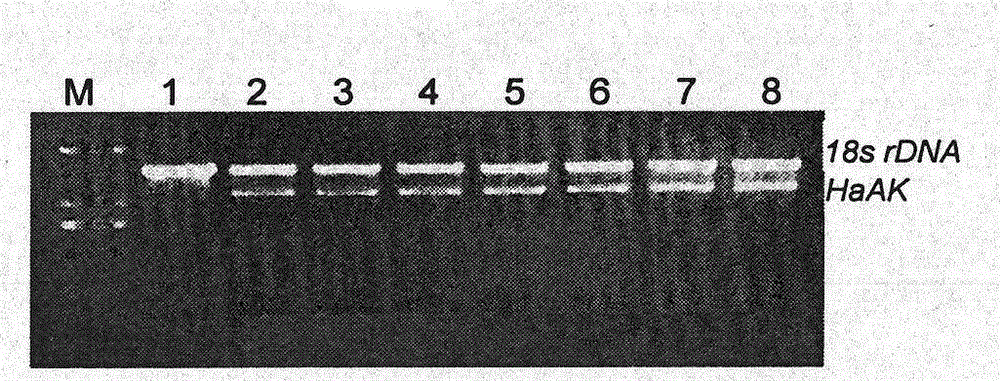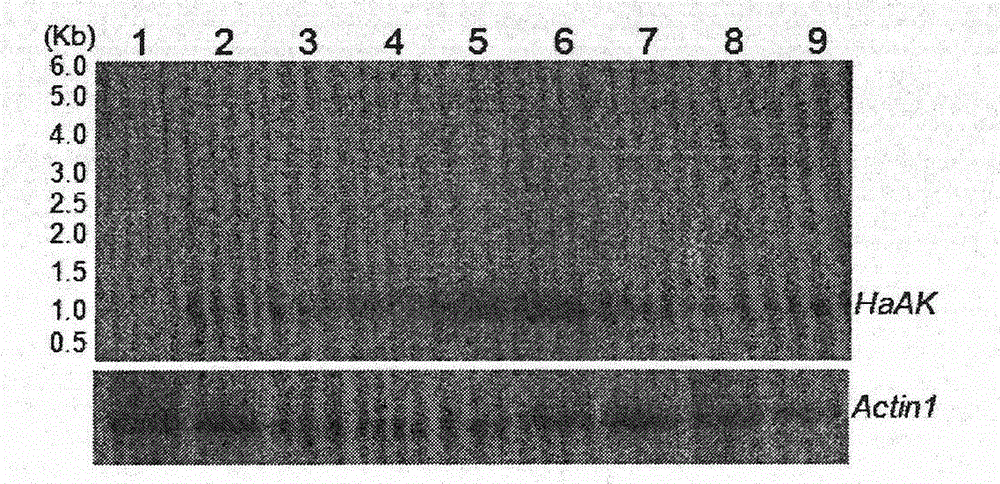RNAi vector for expressing dsRNA of gene HaAK in transgenic plant and application of RNAi vector
A transgenic and genetic technology, applied in the field of agricultural biology, can solve the problems of increasing drug resistance of cotton bollworm, endangering life safety and health, and reducing the quality of crop products.
- Summary
- Abstract
- Description
- Claims
- Application Information
AI Technical Summary
Problems solved by technology
Method used
Image
Examples
Embodiment 1
[0020] Embodiment 1, the cloning of HaAK gene:
[0021] (1) Get 1-2 heads of cotton bollworm, and extract total RNA with TRIzol method;
[0022] (2) Synthesizing the first strand of cDNA;
[0023] (3) Obtain the gene fragment sequence from the transcriptome of cotton bollworm, and after performing homology comparison in the NCBI database, design F1 / R1 according to the sequence using Primer premier 5.0 software;
[0024] (4) F1: 5'-ATGGTGGACGCCGCAACAAT-3';
[0025] (5) R1: 5'-TTACAGCGACTTCTCAATT-3'.
[0026] (6) Using the first strand of the cotton bollworm cDNA synthesized in step (2) as a template, and using the primers in (4) and (5) to perform RT-PCR amplification. The RT-PCR reaction program was: denaturation at 94°C for 5 min; 35 cycles (1 min at 94°C, 1 min at 56°C, 1 min at 72°C); 10 min at 72°C. Reaction system (25μL): 10×Ex PCR Buffer 2.5μL, 2.5mM dNTP Mixture 2.0μL, 10μM upstream primer F11μL, 10μM downstream primer R11μL, cDNA template, 2μL, 5U / μL Ex Taq 0.5μL, ...
Embodiment 2
[0029] Embodiment 2, the construction of RNAi plant expression vector
[0030](1) Based on the cloned HaAK gene sequence of the cotton bollworm, design the specific forward primer F2: 5′-CACCATGGTGGACGCCGCAACAAT-3′ (add four bases to the specific primer F1), and use R1: 5′- Using TTACAGCGACTTCTCAATT-3' as the reverse primer, the plasmid pMD-HaAK was amplified by PCR with Prime STAR™ HS DNA polymerase. The amplification reaction system is (total system 25 μL): 0.25 μL of 5×Prime STAR enzyme, 2.5 μL of 5×Prime STAR Buffer, 2 μL of dNTPs, 1 μL of each primer F2 / R1, 0.5 μL of template pMD18-HaAK, supplemented with ddH 2 0 to 25 μL. The amplification conditions were: 94°C for 5 min, 30 cycles (94°C for 1 min, 56°C for 1 min, 72°C for 1 min), and 72°C for 10 min.
[0031] (2) Recover the amplified blunt-end PCR product, and carry out TOPO directional cloning with the pENTR / D-TOPO vector to obtain pENTR / D-HaAK.
[0032] (3) Transform Escherichia coli strain E.coli TOP 10 competent...
Embodiment 3
[0035] Example 3, Agrobacterium-mediated transformation of Arabidopsis
[0036] (1) Preparation of Agrobacterium Competent Cells
[0037] Agrobacterium LBA4404 stored at -80°C was streak-inoculated on YEB solid medium containing 50 μg / mL rifampicin (Rif), cultured at 28°C for 48 hours, single clones of Agrobacterium LBA 4404 were picked, and inoculated in 5ml YEB (50 μg / mL Rif) liquid medium, cultured at 28°C and 200rpm for 48h, inoculated the overnight culture solution into the YEB liquid medium (erlenmeyer flask) containing 50μg / mL Rif with an inoculum size of 1:100, continued at 28°C and 200rpm Grow to OD 600 The value is about 0.5, about 6-10h. Transfer the bacterial solution to a 50mL sterilized centrifuge tube, put it in an ice bath for 30min, centrifuge the bacterial solution at 5000rpm at 4°C for 5min, and discard the supernatant. Add 10 mL of pre-cooled 0.1M (sterilized) NaCl to the centrifuge tube to thoroughly suspend the Agrobacterium cell pellet (the whole ope...
PUM
 Login to View More
Login to View More Abstract
Description
Claims
Application Information
 Login to View More
Login to View More - R&D
- Intellectual Property
- Life Sciences
- Materials
- Tech Scout
- Unparalleled Data Quality
- Higher Quality Content
- 60% Fewer Hallucinations
Browse by: Latest US Patents, China's latest patents, Technical Efficacy Thesaurus, Application Domain, Technology Topic, Popular Technical Reports.
© 2025 PatSnap. All rights reserved.Legal|Privacy policy|Modern Slavery Act Transparency Statement|Sitemap|About US| Contact US: help@patsnap.com



